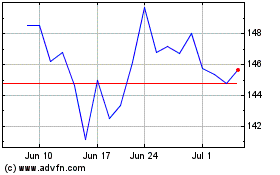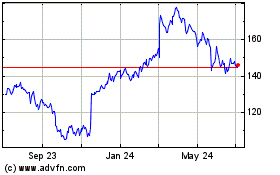By Soma Biswas and Jennifer Smith
The weakest U.S. retailers face the biggest risks from the
coronavirus epidemic if Chinese factories overseas remain
understaffed and customers at home stay away from bricks-and-mortar
stores, according to lenders and analysts.
Luxury chain Neiman Marcus Group Ltd., fabric and craft supplies
chain Jo-Ann Stores Inc., and apparel seller J.Crew Group Inc. are
among the junk-rated retailers exposed to the potential fallout
from the coronavirus outbreak, they said.
China's efforts to contain the epidemic have weighed on its
manufacturing sector as small private factories and larger
state-owned facilities endure extended shutdowns. U.S. retailers
have varied exposure to the manufacturing contraction, depending on
how much of their inventory comes from China or other affected
regions.
Economists say it is too soon to know how much the virus might
affect consumer spending but that it could upend supply chains and
cause some product shortages, especially as retailers run out of
Chinese-made goods already stocked in warehouses. The biggest risk
facing weaker retailers is a possible pullback in demand as the
virus spreads in the U.S., spooking consumers, said Moody's
Investors Service managing director Mickey Chadha.
But if production in China doesn't return to normal levels by
late April, U.S. retailers also could face challenges stocking up
in time for the back-to-school and holiday shopping seasons, said
Thomas O'Connor, a senior director and research analyst for supply
chains at Gartner Inc.
"If you're a smaller retailer, it's likely you'll have more
challenge sourcing your product, and more challenge in terms of
obtaining that inventory at the normal prices you are used to,"
particularly for businesses with large debt loads, Mr. O'Connor
said.
Neiman restructured $4.7 billion in debt last year, and its
liquidity was already a concern before the coronavirus outbreak.
Jo-Ann Stores' sales and earnings also took a hit last year from
higher product prices due to Chinese tariffs.
Neiman is vulnerable to a sharp drop-off in tourism, as foreign
visitors account for 12% to 15% of the company's sales, while
Jo-Ann relies heavily on supplies from China, with over 40% of its
merchandise coming from the country, JPMorgan Chase & Co.
high-yield analyst Carla Casella said in a Monday research
note.
Neiman has been burning cash, drawing down on its revolving loan
over the summer, though it reported access to $354 million in cash
and revolving borrowing capacity in October, ahead of the holiday
shopping season, according to people familiar with the matter. The
retailer has yet to report its earnings for the period covering
last year's holidays, people familiar with the matter said.
Since Neiman was already burning cash, it is vulnerable to a hit
to its revenue and needs a way to pay down or refinance a $137
million bond that comes due in October.
A Neiman spokesperson said the retailer's exposure to tourists
from China is significantly lower than the 12% to 15% total
exposure to tourists estimated by JPMorgan. Neiman's bonds maturing
in 2024, already valued well below par, shed nearly four points
Wednesday to 28.75 cents on the dollar, according to
MarketAxess.
Jo-Ann Stores has seen minimal disruption from the coronavirus,
a spokesperson said. Investors valued the chain's loans at 73 cents
on the dollar on Tuesday, according to IHS Market. Neiman and
Jo-Ann are owned by private-equity firms and only report their
financials privately to shareholders and creditors.
In the event Chinese production slows further or the epidemic
begins affecting other Asian regions more severely, retailers with
the financial heft to access what products are still available may
have an advantage over competitors.
So far, the impact of the coronavirus has been muted for many
retailers, particularly the largest. Some brands and merchants have
breathing room to withstand shocks to their supply chains after
stocking up on inventory last year to get ahead of Chinese tariffs
and in anticipation of factory shutdowns during the Lunar New
Year.
Executives at Target Corp. and Kohl's Corp. said Tuesday the
impact from the virus has been minor. Big retailers tend to have
more diversified sourcing than those with $250 million or less in
annual revenue, said RSR Research LLC managing partner Paula
Rosenblum.
Yet even retailers that source goods outside China often rely on
Chinese factories to finish goods and add on things such as zippers
and buttons, or even to box the goods, according to people familiar
with international supply chains.
J.Crew, which narrowly avoided bankruptcy as part of a 2017 debt
swap, is highly dependent on Chinese imports, which account for 54%
of the company's inventory purchases, according to Moody's. The
retailer didn't respond to a request for comment.
A prolonged production slowdown in China could lead to missing
inventory and potentially erode earnings at J.Crew at a time when
it can't afford to stumble. It is trying to take its smaller and
healthier Madewell chain public and to use proceeds from a public
offering to pay down debt, but it isn't clear whether it will be
able to do so. Most of the company's $1.6 billion in debt is coming
due in March 2021.
Write to Soma Biswas at soma.biswas@wsj.com and Jennifer Smith
at jennifer.smith@wsj.com
(END) Dow Jones Newswires
March 05, 2020 05:44 ET (10:44 GMT)
Copyright (c) 2020 Dow Jones & Company, Inc.
Target (NYSE:TGT)
Historical Stock Chart
From Mar 2024 to Apr 2024

Target (NYSE:TGT)
Historical Stock Chart
From Apr 2023 to Apr 2024
